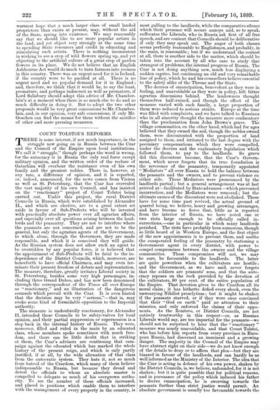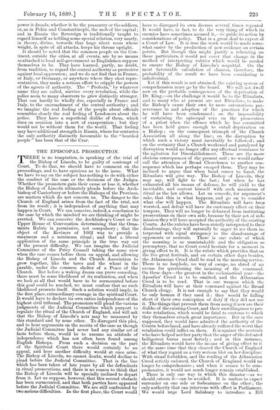COUNT TOLSTOI'S REFORMS. T HERE is some interest, if not much
importance, in the struggle now going on in Russia between the Czar and the Council of the Empire upon local institutions. We call it " struggle," though perhaps the word is wrong, for the autocracy is in Russia the only real force except military opinion, and the written order of the recluse of Gatschina will overbear the resistance even of his own family and the greatest nobles. There is, however, at any rate, a difference of opinion, and it is reported, or, indeed, announced, for the news comes from Vienna as well as St. Petersburg, that the Czar has overruled the vast majority of his own Council, and has insisted on the " reactionary" project of Count Tolstoi being carried out. Under this project, the rural District Councils in Russia, which were established by Alexander 11., and which are elective, are to a great extent set aside in favour of Sub-Prefects who will be invested with practically absolute power over all agrarian affairs, and especially over all questions arising between the land- lords and the peasantry. They are not to interfere where the peasants are not concerned, and are not to be the general, but only the agrarian agents of the Government, to which alone, through the Governors, they are made responsible, and which it is conceived they will guide. As the Russian system does not allow such an agent to be overridden by any popular force, it is believed that the appointment of Sub-Prefects will be fatal to the in- dependence of the District Councils, which, moreover, are henceforth to have official Chairmen, and may even ter- minate their present freedom of debate and representation. The measure, therefore, greatly irritates Liberal society in St. Petersburg, besides some very high personages, in- cluding three Grand Dukes, and has now been denounced through the correspondent of the Times all over Europe as " reactionary," and an illustration of the dangerous counsels which prevail with the Czar. It is even hinted that the decision may be very " serious,"—that is, may evoke some kind of formidable opposition to the Imperial authority.
The measure is undoubtedly reactionary, for Alexander II. intended these Councils to be safety-valves for local opinion, and their partial suppression or supersession is a step back in the internal history of Russia. They were, moreover, filled and ruled in the main by an educated class, whose members spoke sometimes with much free- dom, and there can be little doubt that in striking at them, the Czar's advisers are continuing that cam- paign against the educated which has marked the whole history of the present reign, and which is only partly justified, if at all, by the wide alienation of that class from the autocratic system. They hate it, not so much from hatred of the Czardom, which many of them believe indispensable to Russia, but because they dread and detest the officials to whom an absolute master is compelled to delegate so much of his overgrown autho- rity. To see the number of these officials increased, and placed in positions which enable them to interfere with the management of every property in the country, is most galling to the landlords, while the comparative silence which their presence will secure annoys and, so to speak, suffocates the Liberals, who in Russia ask first of all free speech, and are content that Councils should be deliberative if only they may speak out. The anger of both classes seems perfectly reasonable to Englishmen, and probably, in the main, is reasonable ; but if we understand the contest at all, there is another side to the matter, which should be taken into the account by all who care to study that strangest of problems, the internal progress of Russia. The Czar is not doing anything new, much less displaying a sudden caprice, but continuing an old and very remarkable line of policy, which he and his counsellors believe essential to the safety alike of the Throne and the State.
The decrees of emancipation, benevolent as they were in feeling, and unavoidable as they were in policy, left bitter agrarian dissensions behind. The landowners thought themselves half-ruined, and though the effect of the measure varied with each family, a large proportion of them were reduced to serious straits. Europe at the time was filled with complaints, and we have talked to Russians who in all sincerity thought the measure more confiscatory than the proclamation from John Brown's grave. The village communities, on the other hand, which had for ages believed that they owned the soil, though the nobles owned them, were discontented with the proportion of land assigned to them, and irritated to the last degree with the pecuniary compensations which they were compelled, under the decrees and the explanatory legislation which followed them, to pay to the landlords. So grave did this discontent become, that the Czar's Govern- ment, which never forgets that its true foundation is the reverence of the peasantry, temporarily appointed " Mediators " all over Russia to hold the balance between the peasants and the owners, and to prevent violence on either side. These Mediators were pronounced by the landlords partial ; but a general arrangement was at last arrived at—facilitated by State advances—which prevented insurrection, and the Mediators were removed ; but the ultimate causes of the discontent were not abolished. These have for some time past revived, the actual ground of quarrel being, we believe, heavy and growing arrearages, and have become so fierce that, little as is reported from the interior of Russia, we have noted one or two riots large enough to be officially called in- surrections,—one in particular in which many landlords perished. The riots have probably been numerous, though so little heard of in Western Europe, and the first object of the new appointments is to prevent them, and soothe the exasperated feeling of the peasantry by stationing a Government agent in every district, with power to compel compromises between the owners and the village communities. These compromises will not, we may be sure, be favourable to the landlords. The latter are quite powerless when the cultivators are hostile ; and the Government, as we have said, never forgets that the soldiers are peasants' sons, and that the auto- cracy reposes on the rock provided by the devotion of the cultivators, 80 per cent. of the entire population of the Empire. That devotion gives to the Czardom all its moral claim ; it has hitherto defied every shock, even the unwearying Nihilist proselytism ; but it might be shaken if the peasants starved, or if they were once convinced that their " God on earth " paid no attention to their miseries, and only enforced the claims of their oppo- nents. As the Zemtsvo, or District Councils, are not entirely trustworthy in this respect—or, as Russian Liberals would say, are too impartial for the peasants—we should not be surprised to hear that the " reactionary " measure was nearly unavoidable, and that Count Tolstoi, who has before him reports from every province in Euro- pean Russia, had discerned an imminent and a growing danger. The majority in the Council of the Empire may have abstract right on their side—we do not know enough of the details to deny or to affirm that plea—but they are biassed in favour of the landlords, and can hardly be as well informed as the Ministry of the Interior. The idea that the Czar is acting in defence of his own power, shaken by the District Councils, is, we believe, unfounded, for it is not shaken ; but it is quite possible that for political reasons, and in pursuance of the policy which induced his father to decree emancipation, he is swerving towards the peasants further than strict justice would permit. An absolute government is usually too favourable towards the power it dreads, whether it be the peasantry or the soldiers, or, as in Pekin and Constantinople, the mob of the capital ; and in Russia the Sovereign is traditionally taught to regard himself as holding some special relation, very nearly, in theory, divine, towards that huge silent mass whose weight, in spite of all attacks, keeps his throne upright.
It should be noted that the common people on the Con- tinent, outside the cities, at all events, are by no means so attached to local self-government as Englishmen suppose themselves to be. They have learned, partly, no doubt, from tradition, to regard the central authority as protective against local oppression; and we do not find that in France, or Italy, or Germany, or anywhere where they elect repre- sentatives, they make a serious effort to cripple the powers of the agents of authority. The " Prefects," by whatever name they are called, survive every revolution, while the police seem to many observers to grow distinctly stronger. That can hardly be wholly due, especially in France and Italy, to the encroachment of the central authority ; and we imagine the real feeling of the people about officials resembles closely the real feeling of Londoners about the police. They have a superficial dislike of them, which rises on occasion into a sort of exasperation ; but they would not be without them for the world. That feeling may have additional strength in Russia, where for centuries the only authority distinctly favourable to the " bearded people " has been that of the Czar.







































 Previous page
Previous page